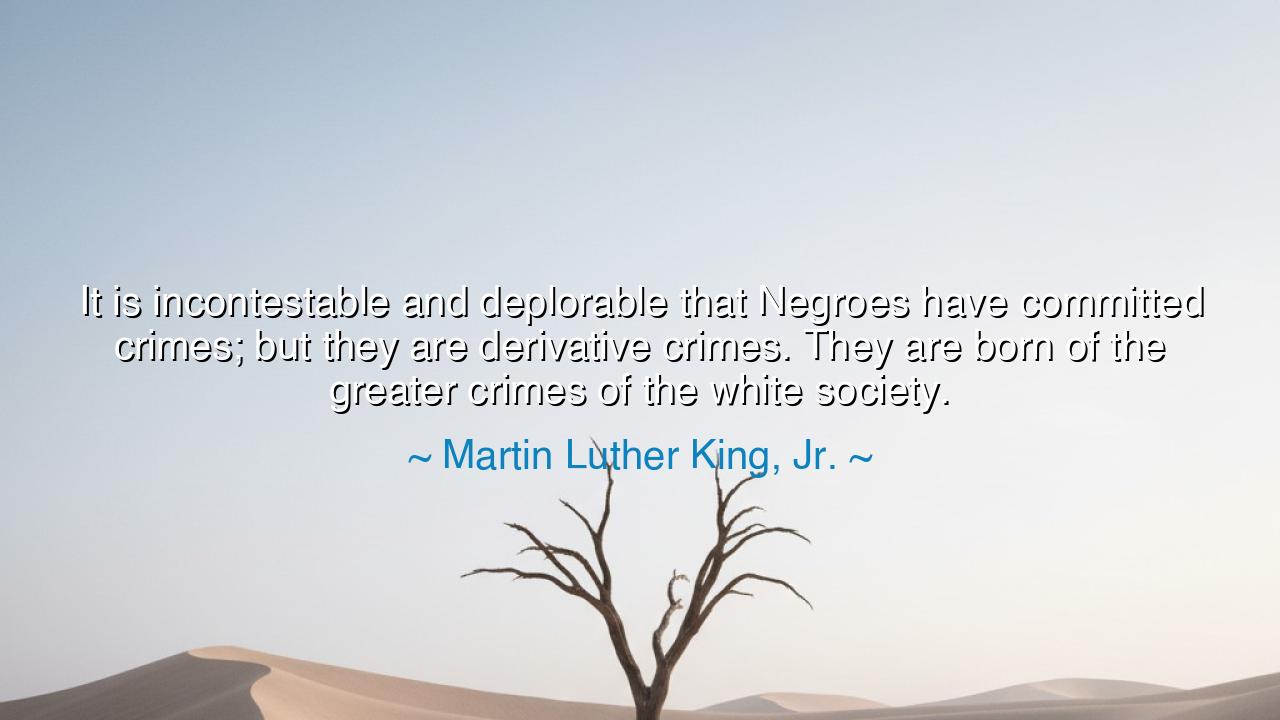
It is incontestable and deplorable that Negroes have committed
It is incontestable and deplorable that Negroes have committed crimes; but they are derivative crimes. They are born of the greater crimes of the white society.






Hear now the solemn words of Martin Luther King, Jr., spoken as both lament and truth: “It is incontestable and deplorable that Negroes have committed crimes; but they are derivative crimes. They are born of the greater crimes of the white society.” These words carry the weight of history’s sorrow and the fire of prophetic vision. For King, in his wisdom, did not deny the failings of the oppressed, but traced their roots to the deeper sins of the society that crushed them. He named the truth that what grows crooked is often the result of seeds sown in poisoned soil.
Understand this: a man’s actions cannot be judged in isolation from the world that shaped him. To condemn the poor, the enslaved, the marginalized for their desperation, without first condemning the injustice that created their condition, is blindness masquerading as righteousness. King declared that the crimes of the oppressed were derivative crimes, born from centuries of slavery, segregation, humiliation, and deprivation. The greater crime of society was the theft of dignity, opportunity, and humanity itself.
Look to the story of America after the end of slavery. When the chains were struck from the enslaved, they were promised freedom, yet left without land, without wealth, without protection from terror. The Reconstruction period brought brief hope, but was soon drowned in the blood of lynchings, the weight of Jim Crow laws, and the daily humiliation of enforced inferiority. From such injustice sprang poverty, broken families, and desperation. To then point to crime among the oppressed while ignoring the systemic crimes that birthed it was, as King saw, hypocrisy of the highest order.
Consider too the ghettos of the twentieth century, where Black families, barred from fair housing, decent schools, and just employment, were penned into neighborhoods stripped of resources. In these harsh places, survival often bred acts condemned by law. Yet who created the conditions? Who denied access to opportunity? Who profited from the suffering? The crimes of the marginalized cannot be understood without first acknowledging the greater crimes of society that drove them to the margins. King’s voice thundered against this injustice, calling the powerful to account.
This wisdom is not confined to one time or one land. Across history, whenever a people has been oppressed—whether the serfs of medieval Europe, the untouchables of India, or the colonized nations of Africa and Asia—the rulers condemned the disorder of the oppressed, while ignoring the crushing weight of their own oppression. The thief born of hunger is called criminal, while the empire that starves him is called lawful. Such is the inversion of morality that King sought to expose.
The lesson is clear: true justice does not stop at punishing the acts of the oppressed; it demands we confront the structures that create oppression. To end derivative crimes, we must first dismantle the original crimes—racism, poverty, exclusion, and hatred. Without this, we treat only the symptoms and leave the disease untouched.
Therefore, O child of tomorrow, take this teaching to heart: do not judge hastily the failings of those crushed beneath the weight of injustice. Instead, ask what greater wrong has twisted their lives. In your own world, resist the temptation to condemn without compassion. Work to heal not only the wound but also the hand that struck it. Strive to build a society where dignity is not denied, where opportunity is not withheld, where justice does not accuse the weak while excusing the strong. For only then shall King’s vision of a truly just and merciful world come to pass.






AAdministratorAdministrator
Welcome, honored guests. Please leave a comment, we will respond soon